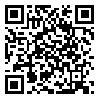Volume 18, Issue 4 (12-2023)
J. Mon. Ec. 2023, 18(4): 441-456 |
Back to browse issues page
Download citation:
BibTeX | RIS | EndNote | Medlars | ProCite | Reference Manager | RefWorks
Send citation to:



BibTeX | RIS | EndNote | Medlars | ProCite | Reference Manager | RefWorks
Send citation to:
Rahmani T, Dreger C, Azarbayejani A, Madani Zadeh S A. Analyzing the effect of exchange rate shocks on inflation inequality: A case study of Iran. J. Mon. Ec. 2023; 18 (4) : 2
URL: http://jme.mbri.ac.ir/article-1-664-en.html
URL: http://jme.mbri.ac.ir/article-1-664-en.html
1- Associate Professor, Faculty of Economics, University of Tehran
2- Senior Research Fellow
3- PhD in Economics
4- Assistant Professor, Faculty of Economics, Sharif University of Technology
2- Senior Research Fellow
3- PhD in Economics
4- Assistant Professor, Faculty of Economics, Sharif University of Technology
Abstract: (146 Views)
This study examines the effects of exchange rate shocks on poor and rich households and inflation inequality in Iran over the period 2003m4-2022m4. Based on the econometric results, a one percentage point increase (depreciation) of the exchange rate (Iranian Rial versus US dollar) is expected to lead to a rise in food price inflation of about 0.1 in the short and 0.8 percentage points in the long run. The effect on non-food price inflation tends to be slightly lower, both in the short and the long run. As the share of food in the consumer baskets is higher for poor than for the rich households, depreciations of the exchange rate are more harmful at the lower end of the income scale. Likewise, poor households will benefit more, if the Rial appreciates against the US dollar.
Article number: 2
Keywords: inflation inequality, exchange rate shocks.
Type of Study: Original Research - Case Study |
Subject:
Economics
Received: 23 Jul 2024 | Accepted: 10 Dec 2024 | Published: 18 Feb 2025
Received: 23 Jul 2024 | Accepted: 10 Dec 2024 | Published: 18 Feb 2025
| Rights and permissions | |
 |
This work is licensed under a Creative Commons Attribution-NonCommercial 4.0 International License. |





